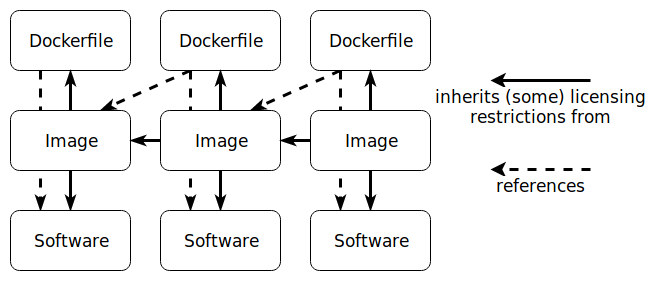A container image (a file system that may include various copyrighted works) and the scripts to build these images (like a Dockerfile) are separate works. In general, the license of the included software is completely unrelated to the license of the build scripts.

If you build upon a build script, you are bound by the license of that build script (but this is not how Dockerfiles are typically used). If there is no explicit license, you have no right to distribute or modify the build script. So you cannot modify or distribute arbitrary Dockerfiles from GitHub unless you have a license.
If you build upon an already built base image, you have to comply with the license of that base image AND with the licenses of all included software. If the image is not offered under an express or implied license then you have no rights to copy and use it. In practice many images will directly or indirectly contain GPL'ed software such as the Linux kernel. This could indicate that the image is an aggregate work. (I do not think technical details such as image layering are legally relevant here.) Under the terms of the GPL the image author must not prevent you from exercising your rights under the GPL with regards to the GPL'ed software in the aggregate.
It is however not necessary to notify you of the exact licensing status of all included software on a download page or similar, so the lack of license indication on the Docker Hub or similar places is mostly fine. You can be expected to look into the documentation for licensing information. Some platforms like the Docker Hub or GitHub may provide a default license grant. Note that some users might offer images under the default license without having the necessary rights (e.g. the Docker Hub default license looks excessively permissive for most software).
Note also that some images may include more restrictive licenses. It is your responsibility to check this prior to use. For example, there may be additional trademark requirements.
It can also be the case that the license on the Docker Hub page is misleading. E.g. I found an unofficial image with the Oracle JDK software that is only offered under an Oracle EULA, yet the Docker Hub page mentions the MIT license. It is correct that the build scripts are offered under the MIT, but this license cannot apply to the software in the image.
So to summarize your questions:
Can you use the image? Typically yes.
Strictly speaking, only if you comply with the license of the image and the licenses of all included software. In absence of a license, all rights are reserved. It is your responsibility to check the license status.
Can you modify the image (use as base image)? Typically yes.
Strictly speaking, only if this is allowed by the license of the base image and the licenses of all affected software.
Can you distribute the (modified) image (outside docker hub)? Typically yes but there may be additional requirements.
Strictly speaking, only if this is allowed by the license of the base image and the licenses of all included software.
Can you build the docker image (from the Dockerfile)? Typically yes.
Strictly speaking, only if this is allowed by the license of the build scripts, the licenses of the base image, and the licenses of all included software.
From what I see, image licensing is a bit of a mess. You will have to exercise due diligence when choosing base images for anything other than purely personal use. Building your own images aside from some official base images may be a wise choice.
